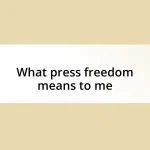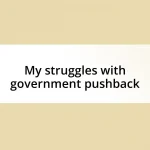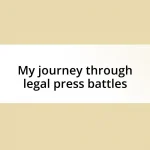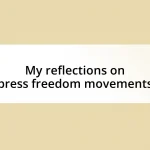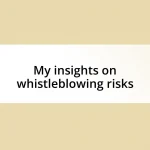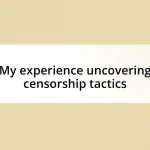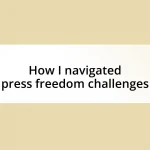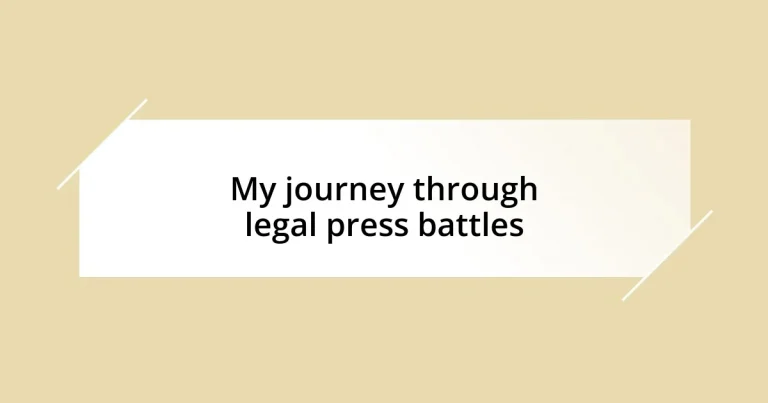Key takeaways:
- Understanding the interplay between law and media is crucial, as misinformation can escalate public perception issues before legal responses are made.
- A robust media strategy, including proactive messaging and crisis management, is essential for navigating legal press battles and protecting reputation.
- Building a support network enhances resilience and provides diverse perspectives, making it easier to cope with challenges during legal crises.
- Genuine communication and transparency are vital in fostering trust and collaboration, especially in high-pressure situations.
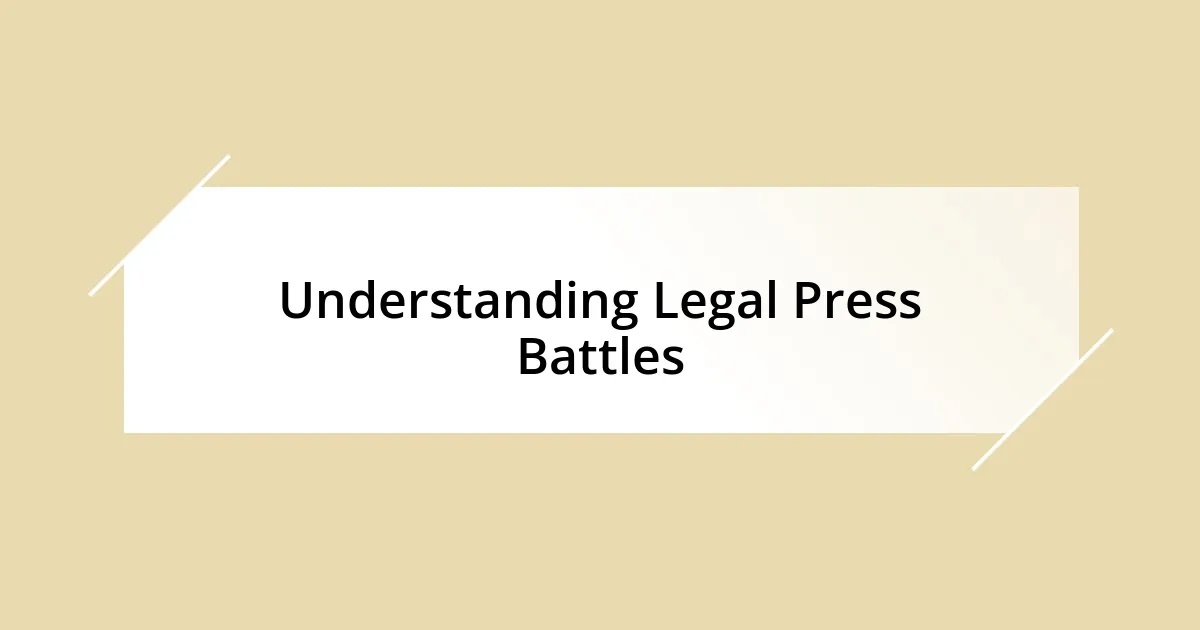
Understanding Legal Press Battles
Understanding legal press battles can feel like navigating a labyrinth. I remember my first experience with a legal press issue, where every word in an article felt like it could tip the scales of public opinion. Have you ever considered how a well-placed headline can create waves of controversy? It’s astounding how the media can shape perceptions before the legal system even has a chance to respond.
At the heart of these battles lies a complex interplay between law and journalism. I once found myself caught off guard by how quickly misinformation could spread; it left me wondering how many people blindly accept what they read. The emotional weight of this process is often tremendous; every article published can amplify stress and anxiety for the parties involved. It’s in these moments that the importance of accuracy and integrity in reporting becomes crystal clear.
Moreover, the stakes can escalate quickly, as each side tries to influence not just the court of law but also the court of public opinion. I learned firsthand that stakeholders often need to employ strategic communication tactics, and occasionally, I found myself thinking—what would I have done differently if I had the chance? It’s a constant reminder that legal press battles are not just about facts; they’re also about narratives, emotions, and the quest for justice in a very public arena.
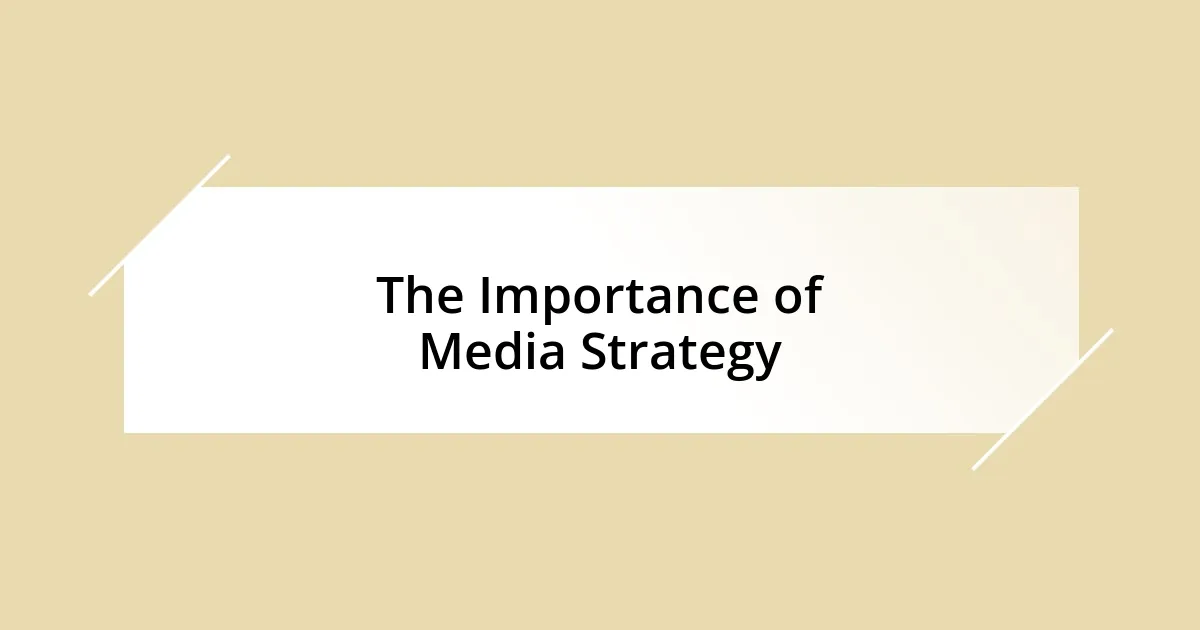
The Importance of Media Strategy
In my experience, a well-crafted media strategy is crucial during legal press battles. I recall a particularly challenging case where the media coverage was relentless. By aligning our messaging with the facts and preparing for possible misinterpretations, I felt we could reclaim some control over the narrative. It was during those frantic media interactions that I truly understood the power of strategic communication—preemptive actions can significantly mitigate negative press.
Here are some key aspects of why a robust media strategy is essential:
- Proactive Messaging: Establishing clear, consistent messages can counterbalance any misinformation.
- Anticipation of Coverage: Understanding the media landscape allows for anticipating coverage trends and potentially influencing them.
- Reputation Management: A well-planned strategy can protect not only your legal stance but also your personal and professional reputation.
- Building Relationships: Developing rapport with journalists fosters trust and can lead to more balanced coverage.
- Crisis Management: In the heat of a press battle, having a defined strategy for addressing crises can diminish the fallout from negative stories.
I’ve learned that navigating the intersection of law and media isn’t just about facts—it’s also about emotions and perceptions. I experienced moments of despair when rumors spiraled out of control, and it became clear that effective media strategy could be the lifeline that transforms a potential disaster into an opportunity for clarity and fairness.
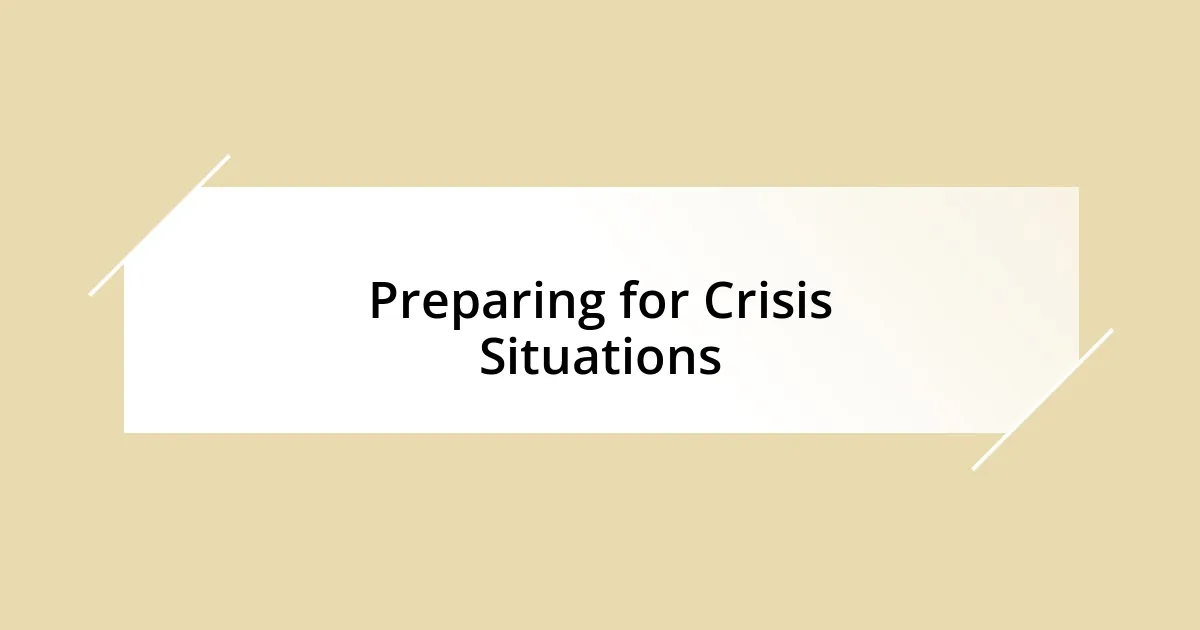
Preparing for Crisis Situations
When preparing for potential crisis situations, it’s vital to have a solid plan in place. I recall a time when a sudden announcement triggered widespread media attention. My team and I quickly assembled a crisis response plan, which included crafted statements and designated media spokespeople. It felt like assembling a safety net—one that could catch us if any negative narratives began to take flight. Having this framework ready helped ease my anxiety as I felt more in control.
The emotional toll of navigating crises can be overwhelming. I learned that communication needs to be both swift and sensitive, particularly when emotions are running high for everyone involved. During one challenging moment, I found myself at a press conference, grappling with unexpected questions that could sway the public’s opinion. I had to remember to pause, breathe, and articulate carefully. It was a poignant reminder that how we respond in moments of pressure can significantly shape the outcomes we face.
Being prepared is about more than just crafting messages; it’s about anticipating the emotional landscape. I’ve invested time in role-playing scenarios with my team, simulating various crises to sharpen our response strategies. This practice created a camaraderie and reduced the fear of the unknown. After all, when a crisis strikes, knowing your team is on the same page provides a sense of solidarity and hope, giving us the strength to face whatever comes next.
| Preparation Aspect | Description |
|---|---|
| Planning | Having a defined crisis response plan ready can ease anxiety and provide structure. |
| Emotional Sensitivity | Understanding how emotions can influence outcomes helps in crafting thoughtful responses. |
| Role-Playing Scenarios | Simulating crises with your team enhances confidence and team cohesion. |
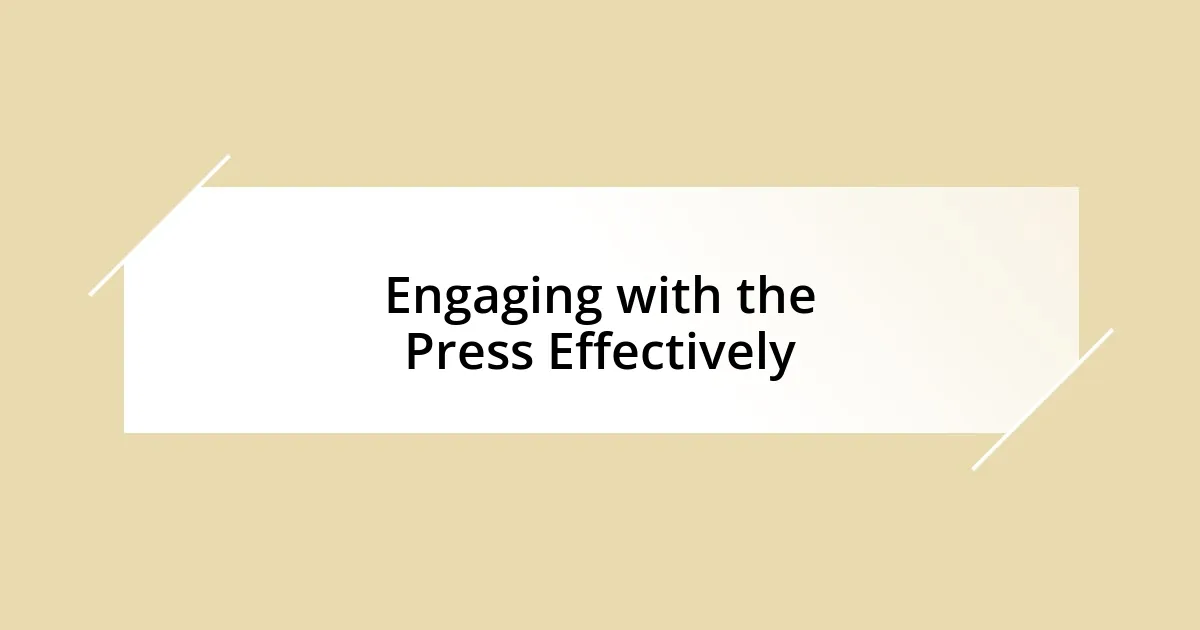
Engaging with the Press Effectively
Engaging with the press effectively requires a balance of transparency and control—something I learned firsthand. Once, during a particularly intense media frenzy surrounding a case, I felt like a deer in headlights. However, I realized that by offering open lines of communication, I could shape the dialogue rather than just react. This not only helped my team feel more unified but also illuminated the importance of being approachable; when reporters see you as a trustworthy source, they often give your perspective more weight.
One practice that proved invaluable was holding regular media training sessions with my team. It was eye-opening to see how hesitant we were at first, fumbling over our words as nerves crept in. But with each session, I noticed a shift—we became more confident, more articulate. The key for me was understanding that each interaction with the press is an opportunity to tell our story authentically. Have you ever considered how your comfort level with media interactions could influence your narrative? I found that by embracing these engagements, we transformed potential misunderstandings into meaningful dialogues.
A pivotal moment came when I was faced with a particularly hostile interview. Initially, my heart raced, and anxiety bubbled up; there was a lot at stake. But a simple mantra—“stay calm, stay focused”—helped me regain my composure. I realized that engaging with the press effectively isn’t just about defending your position; it’s about presenting yourself as a human being and allowing that authenticity to break barriers. By sharing a personal anecdote or an insight related to the case, I found that I could connect on a more profound level, turning tensions into constructive conversations.
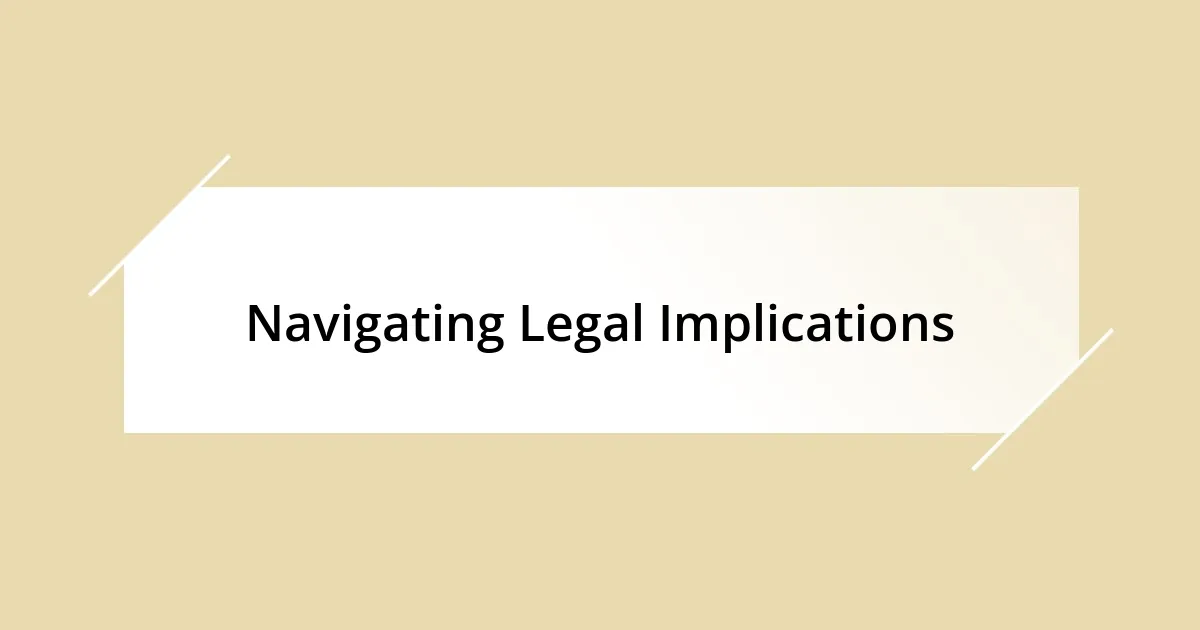
Navigating Legal Implications
When it comes to legal implications, understanding the landscape is crucial. I remember receiving a letter that outlined potential legal actions against my team due to a miscommunication. My heart sank, but it became a turning point in my understanding of how intertwined law and media can be. I learned quickly that not all words are equal in the legal world; some can carry weighty consequences, and I soon found myself immersed in legal jargon, piecing together what was at stake.
One strategy that proved effective was consulting with legal experts during media engagements. There was a time when a public statement I wanted to make felt crucial, yet I hesitated, realizing its potential legal ramifications. By involving our legal counsel, I managed to craft a statement that conveyed our message while adhering to the necessary guidelines. Have you ever felt that fine line between being informative and covering your bases? I can testify that having legal counsel by my side empowered me to be bold while staying protected.
It’s essential to foster an environment where legal advice is readily available. I’ve taken to hosting informal lunch-and-learns with our legal team, creating a space where my colleagues and I could voice our concerns and ask questions without fear. This openness has not only demystified legal aspects for us but also built a rapport that allows for quick consultations during intense moments. The more you embrace this collaborative approach, the more confidently you can navigate potential pitfalls, ensuring that what you say won’t come back to haunt you later.
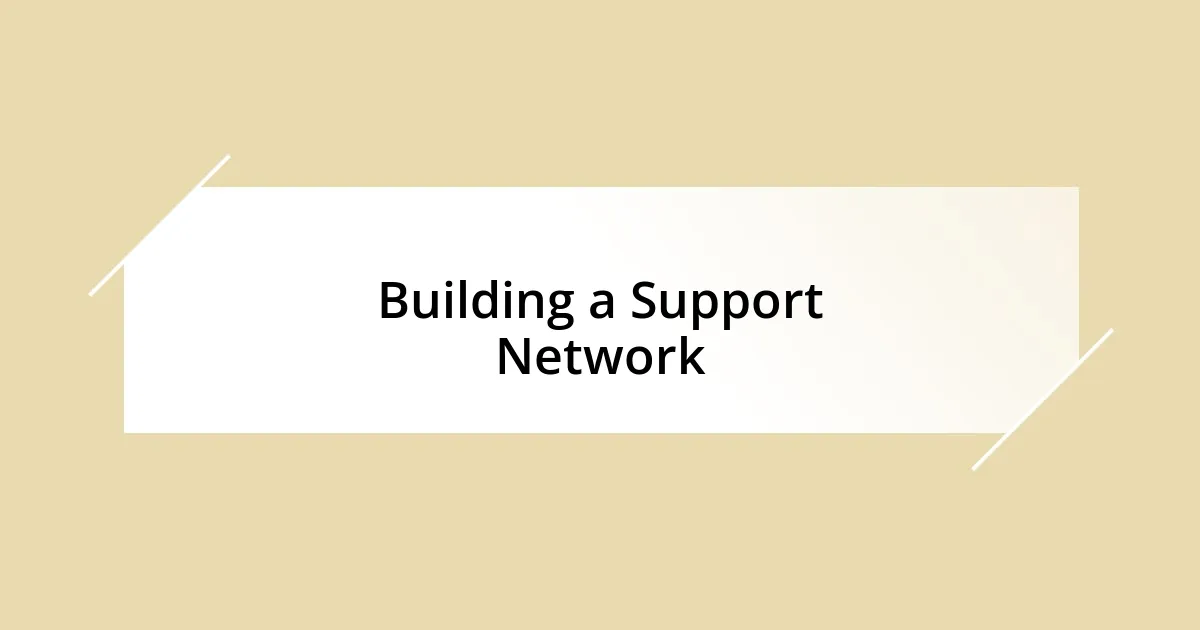
Building a Support Network
Building a robust support network was a game-changer in my journey through legal battles with the press. I remember feeling incredibly isolated during one particular crisis, grappling with negative press and mounting stress. It was only when I reached out to colleagues and mentors that I realized how powerful shared experiences can be. Did you ever notice how a simple conversation can lift your spirits? In those discussions, I found not only guidance but also a sense of camaraderie that fortified my resolve.
As I engaged with my network, I began to see the value of diverse perspectives. I was fortunate enough to have friends who were seasoned journalists and legal professionals, and their insights became vital during challenging times. One afternoon, a mentor offered some crucial advice that reshaped my approach: “Think of your support network as your safety net. If you fall, they’ll catch you.” And you know what? That reassured me; believing that I wasn’t alone made all the difference. Have you thought about who you could lean on in tough moments? Remember, having a mix of voices in your corner can bring clarity when decisions become murky.
I also learned the importance of being proactive in nurturing these connections. Regular check-ins and collaborative discussions became our norm, which turned acquaintances into allies. For instance, after a particularly tough press release, I initiated a casual gathering with my network to dissect our strategies. The vibe was relaxed, and even the most tense topics became easier to discuss. It’s interesting how by fostering an environment where everyone feels valued and listened to, you not only strengthen your support system but also cultivate deeper trust and understanding. Don’t underestimate the power of simply being there for one another—it can truly transform how you approach your own challenges.
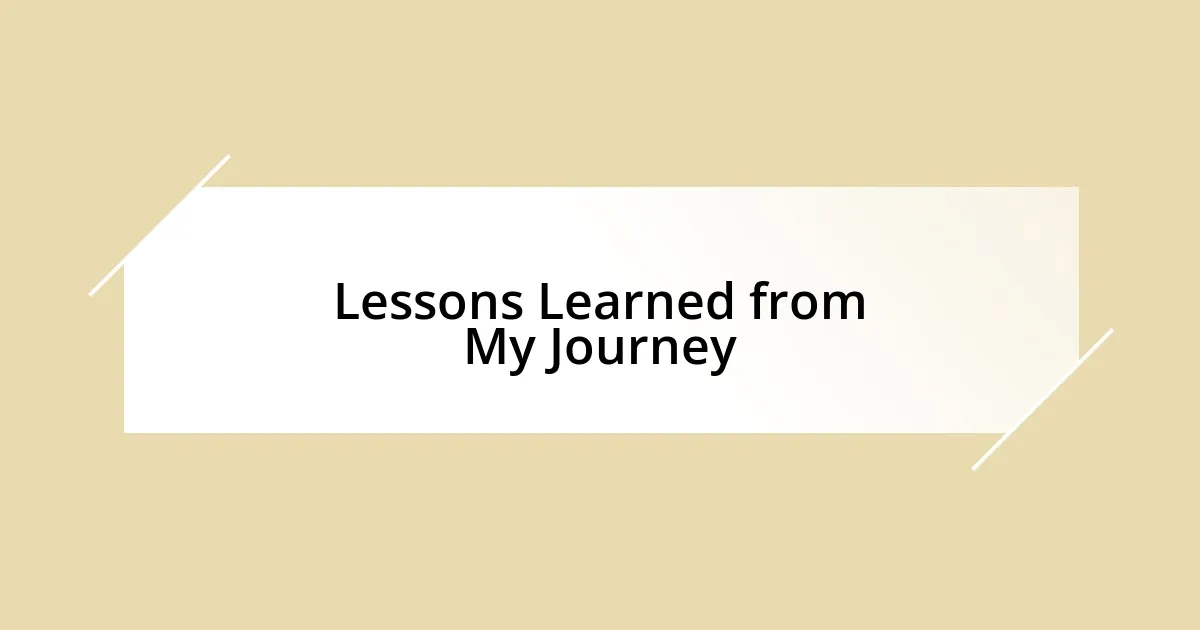
Lessons Learned from My Journey
The most significant lesson I learned from my journey is the power of resilience. There were moments when the pressure seemed unbearable; a specific instance stands out when I received a barrage of negative media coverage that threatened to engulf my reputation. It felt like a punch to the gut, but in those hardest moments, I found strength within myself that I didn’t know I possessed. Have you ever faced a situation that tested your limits? I realized then that each setback was an opportunity to reassess, regroup, and bounce back stronger.
I also discovered that seeking clarity amid chaos is invaluable. During a particularly heated press battle, I sat down with my team to untangle the misinformation being spread. By breaking everything down, we pinpointed what truly mattered, allowing us to focus on our core message instead of reacting to every sensational headline. It’s fascinating how taking a step back can illuminate the path forward. Can you recall a time when simplifying your perspective helped you regain control? It made me appreciate the importance of not just reacting but strategizing—and that has made all the difference.
Finally, I learned that genuine communication is a key ingredient for navigating legal disputes. Early on, I made assumptions about how to address the press, but I quickly realized that transparent dialogue was the remedy. There’s this one instance where I candidly explained our side during a media briefing; it was nerve-wracking, but seeing the relief on my team’s faces was invigorating. When we open ourselves up to honest discussions, we not only rebuild trust but also create a more resilient team atmosphere. Have you experienced how authenticity can shift perceptions? Embracing that principle has transformed how I operate, turning obstacles into collaborative opportunities.
